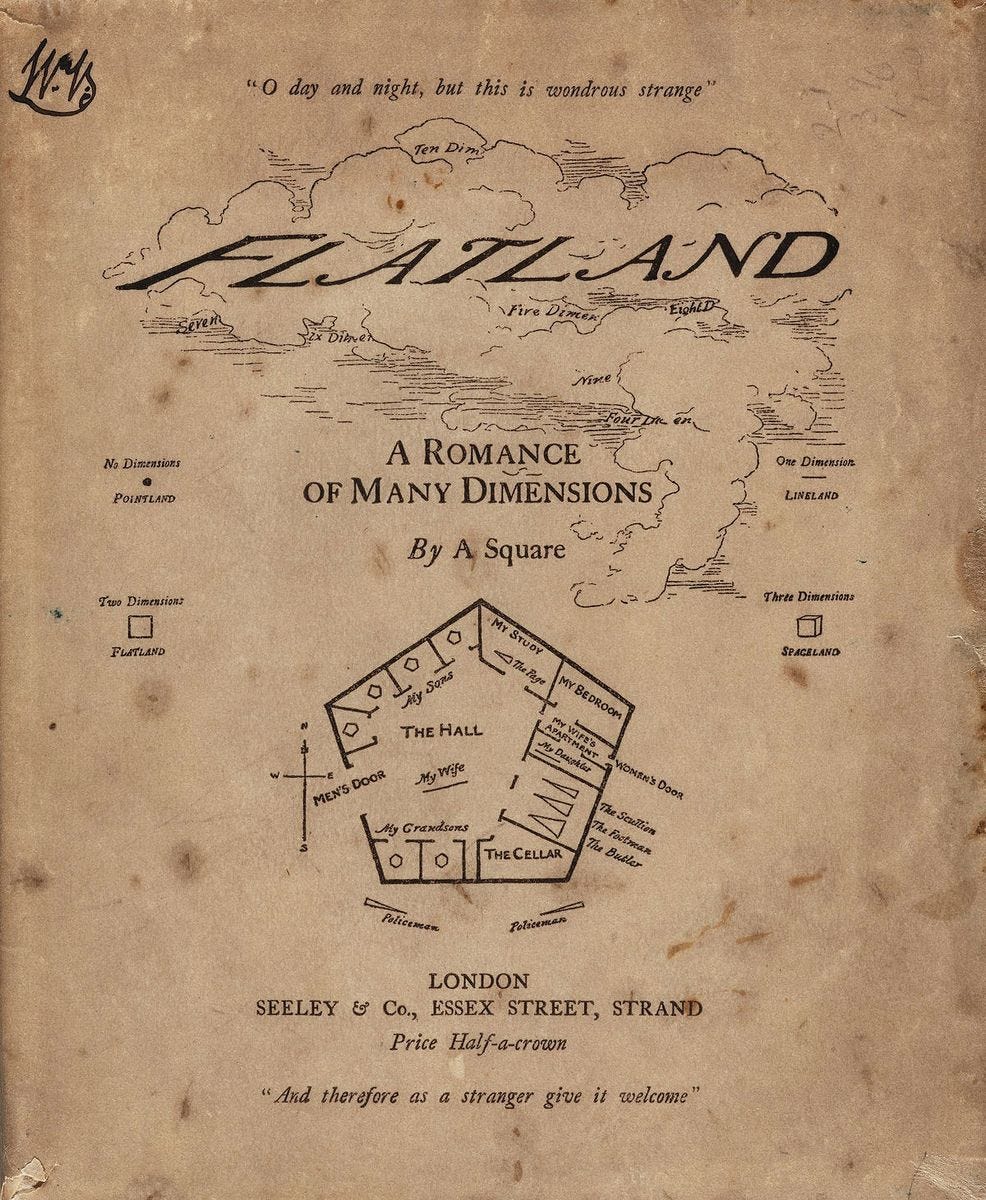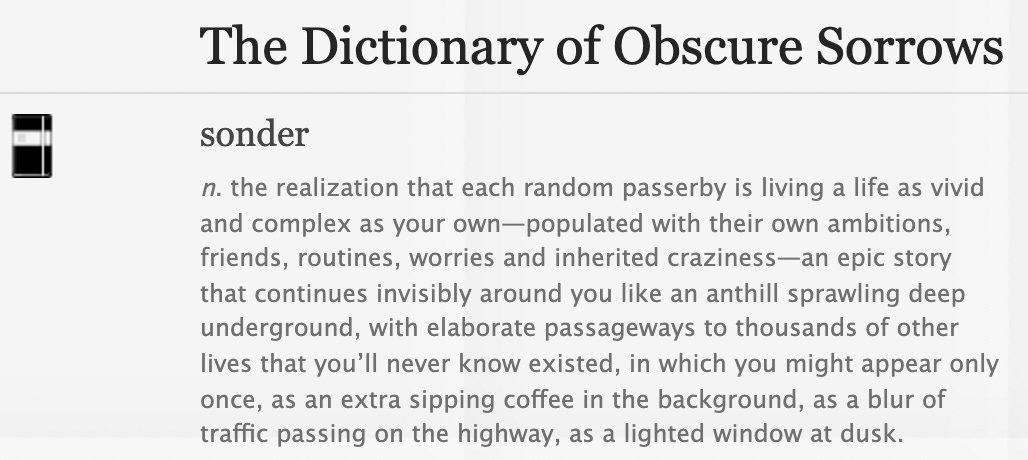Insider #20 - Other People Exist.
ideas from my appearance on the seen/unseen podcast (part ii)
👋🏼 Hello, Insiders!
Today I continue the series based on my conversation with Amit Varma on his podcast, The Seen and the Unseen. In Part 1, I ruminated on the hypothetical question that Amit used to open the episode - Would Da Vinci make a TikTok channel?
In this post, I want to share a period from my life that Amit highlighted, when I came to a profound realization about myself and my place in the world.
Sharing my journey required me to put down markers at different times of my life. And, as I look back at the exercise, I become aware of a curious thing that happens whenever a person narrates their story. Let’s talk about that too!
🌏 The Person at the Centre of the Universe
Listen: When you start off in this business of life, nobody else exists. Only you are real.
Everything and every other person revolves in an orbit around you. It takes a lot of time to come out of this phase. Years, at the least, but entire lifetimes in some cases. A lot of people never make it.
It took me a very long time. Everything was about me. I was at the centre of the universe.
In the early sci-fi novella Flatland, the author describes how a 2D world might work compared to our 3D world. Through the eyes of a protagonist in Flatland, we see different shapes of beings interacting with each other on a flat surface, and we observe their socio-political structures.

Afterwards, the protagonist visits a 1D world - an entire world which exists as a single line. All life forms in this world are locked into moving in one direction. For their entire lives, all they see is one person in front of them, visible as a point. For their entire lives, they know there is at least one more person behind them, but whom they will never see. This is their universe.
In the final part of the book, the protagonist visits a zero-dimensional world - an entire world that is just a point. It cannot go anywhere, because there is no concept of other places. There is no ‘up’ or ‘down’, ‘forward’ or ‘backward’, ‘left’ or ‘right’. This world is also blind because it has nothing to see. This world can hear the protagonist, but because it does not understand the concept of another life, it believes the voice to be its own. This world is literally and metaphorically a singularity. Everything is itself.
This world might have been you at a certain stage in your life, as it was me once. To see higher dimensions than yourself takes monumental effort. You have to accept a smaller role for the self in order to appreciate the larger world.
Amit read out a passage from a newsletter post I wrote, when I was mulling over a writing prompt. The prompt was - “What incident changed your point of view about something important?”
I wrote about the time that I finished reading Kurt Vonnegut’s Breakfast of Champions. In the story, the protagonist reads a novel which convinces him that there is only one creature with free will in the universe and everyone else is a robot. The only creature with free will is himself, the reader of the novel.
I had a profound realization when I finished the book, and it cured me of a sickness I had been carrying inside me for many years. This sickness was such a deep part of me that, for a long time, I had not even considered it a sickness. I thought of it as my superpower.
The realization was this, as I said to Amit -
“Other people exist.”
The sickness was my cynicism - about the world, about life, and everything that I was too cool for.
This happened first.
I was in the 7th grade, and our English Lit teacher stood me up in the middle of class. I don’t remember what I did, but I might have made one joke too many. In front of everyone, he declared - “Nishant, you are the most cynical person I have ever met in my life!”
I took it as a great compliment. I was 12 or 13 years old, and the idea of being cynical beyond the imagination of a grown adult tickled me to no end. Cynicism was smartness. Cynicism was pragmatic. Cynicism was the way of adults. I took pride in my cynicism. It helped me fight off insecurities before the popular guys in school. It helped me deal with my social inadequacies. It gave me a sense of humour. I won many battles with the sharp edge of my wit.
When I was in high school, words were both my weapon and armour. I used them to strike pre-emptively at others before they could hurt me. I was always expecting others to hurt me. Some of them might have, but others probably never thought about it at all. But just to be safe, I struck first. I acted out of an abundance of precaution.
You see, no matter what I did, I was the victim. I had to be because I was the only person in the universe.
Cynicism was good to me for many years. It helped me write funny jokes, draw funny comics, and make biting observations about pop culture. Sometimes it helped me go viral on social media. I wrote for television channels, drew for newspapers, scripted short films, and always my cynicism helped me say something others could not, or would not. I didn’t care if I struck too hard or without provocation. War was peace. Attack was defence.
But one day, I found the fountain of my creativity had gone dry. I could not write. After struggling for many months I came to the conclusion that I had reached the end of the tether with cynicism.
Cynicism is like a wall we build inside our mind. Brick by brick, we do it to protect what is most vulnerable inside us. We hide that thing behind walls so others cannot know, so they cannot mock us the way we mock them. It shields us from people, and also from other horrors of the outside world - pain and fear and shame and rejection. Nothing can breach the walls. And every year, the walls grow higher. Every morning, you climb the ramparts and rain arrows upon the enemy at the gates.
Soon the walls are so high that nothing exists in your world except for you. Your wit, starved for enemies, turns on itself. You are the one it hurts now, and the walls are too high. No one can hear your screams.
The realization Kurt Vonnegut gave me was that in order to be a really good writer I had to embrace shame and fear and pain and rejection. I had to lower the walls, and be vulnerable to such feelings. I had to lower the walls, or there would be no way to see the world and reach out to embrace reality. I wanted to be a really good writer. I had to lower the walls in order to make my world bigger.
🎲 The Problem with Narratives
In the fantastic book Order of Time, physicist Carlo Rovelli speaks about the fundamental ways in which we misunderstand the nature of Time.
We think of it as something static in our minds, to be looked at whenever we desire, something that can be refreshed if we look back often enough. We place a lot of importance on what we heard, and what we saw, and how it made us feel. After all, we can trust our eyes and ears, right?
Wrong. Listen to this wonderful episode of the Hidden Brain podcast about the fallibility of memory:
Memory is not like a video camera; a better way to think of it is as an act of reconstruction, or what you might call "mental paleontology."
Similarly, in Order of Time, the author talks about how the past does not actually exist in any objective way. It exists only inside our minds. The only thing that exists is the present moment. And this one. And this one. And so on.







